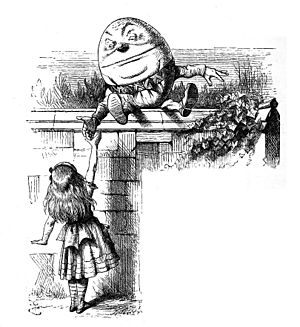Unbirthday facts for kids

An unbirthday is a special day you can celebrate on any day of the year that is not your actual birthday. It's a fun idea that first appeared in a book by Lewis Carroll called Through the Looking-Glass in 1871. This idea later inspired "The Unbirthday Song" in the 1951 Disney movie Alice in Wonderland.
Contents
What is an Unbirthday?
An unbirthday is a new word, or neologism, that means any day that isn't your birthday. Since there's only one birthday each year, that means there are 364 unbirthdays! (Or 365 in a leap year). This gives you many more chances to celebrate throughout the year.
Unbirthdays in Books
The idea of an unbirthday first appeared in Lewis Carroll's book Through the Looking-Glass. In the story, Humpty Dumpty tells Alice about his "un-birthday present." He received a fancy cravat (a type of necktie) from the White King and Queen. Humpty Dumpty then asks Alice to figure out how many unbirthdays there are in a year.
Unbirthdays in Movies
The unbirthday idea became very famous in the 1951 Disney animated film Alice in Wonderland. In the movie, Alice finds the Mad Hatter, the March Hare, and the Dormouse having a party. They are singing "The Unbirthday Song."
Alice doesn't understand what an unbirthday is at first. But when the Mad Hatter explains it, she realizes it's her unbirthday too! She then gets a special unbirthday cake from the Mad Hatter. This scene in the movie mixes the unbirthday idea from Through the Looking-Glass with the famous "Mad Tea Party" from Carroll's other book, Alice's Adventures in Wonderland.
Later in the film, the Mad Hatter talks about this unbirthday party during Alice's trial. The King of Hearts then realizes it's the Queen of Hearts' unbirthday too! Because of this, the trial stops so they can celebrate.
Unbirthdays in Comics
The unbirthday party was also featured in a comic book released in 1951. This comic came out around the same time as the Disney movie. The comic version was much longer than the movie scene. In the comic, Alice is invited to an unbirthday party for Tweedledum and Tweedledee. Humpty Dumpty also appears in the comic story.
See also
 In Spanish: No cumpleaños para niños
In Spanish: No cumpleaños para niños
- Through the Looking-Glass at Wikisource

